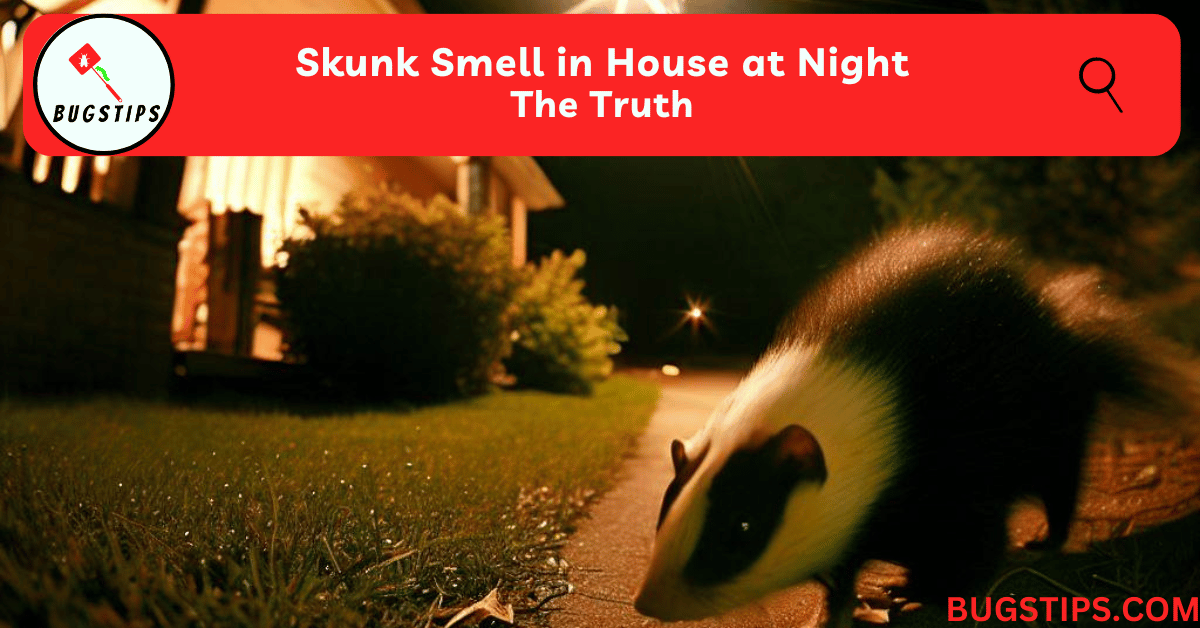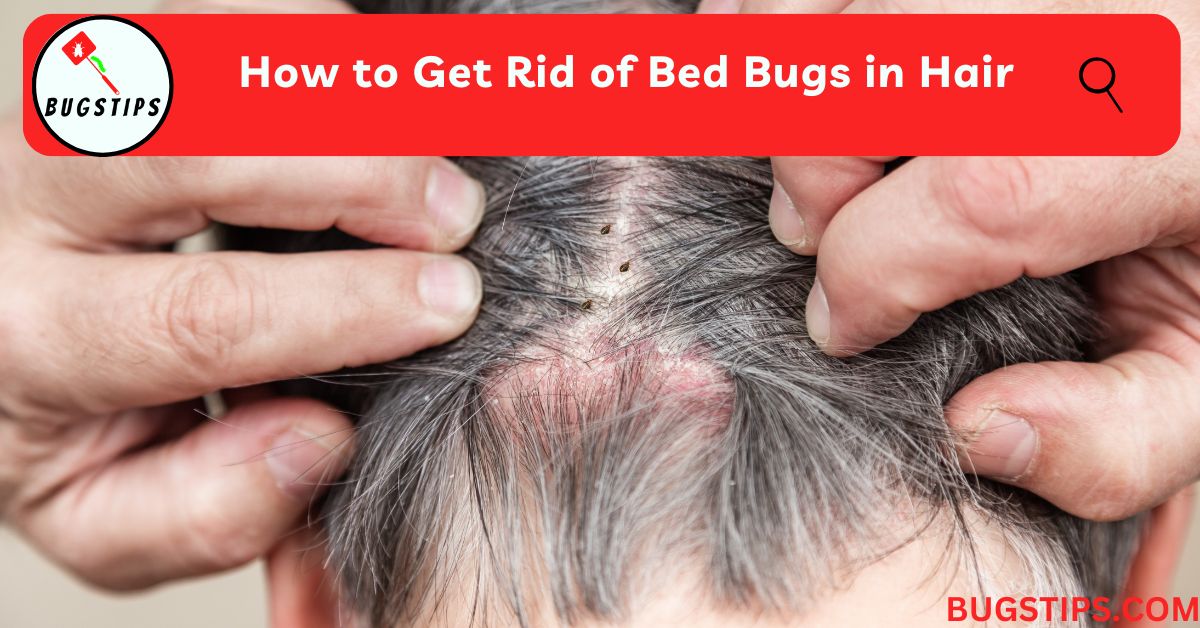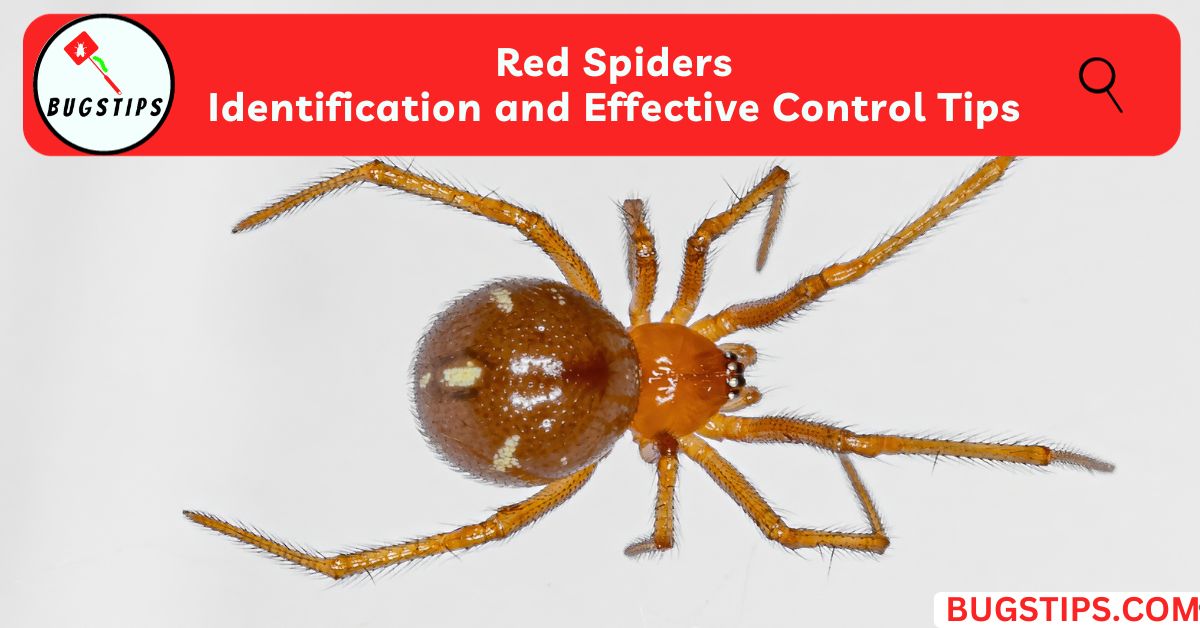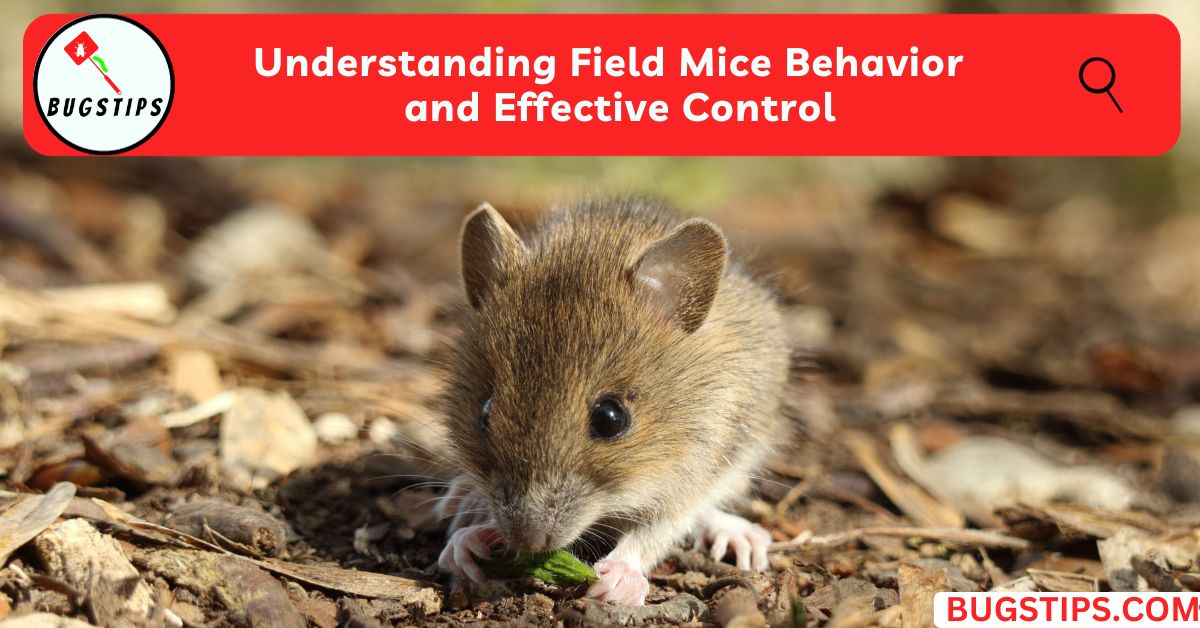This post may contain affiliate links which means as an Amazon Associate, this site may earn a small commission on qualified purchases made through links at no extra cost to you. Learn more on Affiliate Disclosure
Have you ever experienced the unpleasant surprise of waking up to a skunk smell in your house at night? The powerful and distinctive odor can quickly disrupt your peaceful evening and leave you wondering how it managed to invade your home.
In this article, we will explore the phenomenon of skunk smell in the house at night, providing insights into why it occurs, the potential dangers, and effective solutions to eliminate the odor.
By understanding the causes and implementing preventive measures, you can regain control of your living space and ensure a fresh-smelling home environment. So keep reading to know more!
Skunk Smell in House at Night: Understanding the Issue
If you’ve ever experienced a strong skunk odor wafting through your house at night, you know how unpleasant and overwhelming it can be. Skunk spray can be a common issue for homeowners, particularly in areas where skunks are prevalent.
Why Does My House Smell Skunk at Night?
The skunk smell in your house at night is often a result of skunks spraying their defensive odor in the vicinity. Skunks possess scent glands that produce a strong and pungent spray.
When they feel threatened or alarmed, they release this spray as a defense mechanism. Unfortunately, if a skunk is in close proximity to your home or if its spray has reached your house, you might find yourself dealing with the lingering odor.
Why Do Skunks Spray at Night?
Skunks are primarily nocturnal creatures, meaning they are most active during the nighttime hours. This nocturnal behavior is influenced by their preference for darkness and their ability to hunt for food more effectively under the cover of darkness.
Consequently, skunks are more likely to encounter potential threats or triggers during the night, leading to the release of their spray as a defensive measure.
Related Article – Skunk Holes | The Comprehensive Guide
How Many Times Can a Skunk Spray in One Night?
Skunks have the remarkable ability to spray their defensive odor multiple times in quick succession. While the exact number can vary, skunks are known to release their spray up to six times in a row. Each spray contains a potent combination of chemicals that help them ward off predators or perceived threats.
Once a skunk has exhausted its spray reserves, it can take up to 10 days for the scent glands to fully recharge and produce more spray. This means that if you encounter a skunk and it sprays, it may have several more sprays left in reserve.
Understanding these aspects of skunk behavior can shed light on why your house may smell like skunks at night. Skunks are creatures of the night, and their defensive spraying mechanism is vital to their survival.
How Long Does Skunk Smell Last?
The duration of the skunk smell can vary depending on various factors. Mild skunk odors can often be eliminated with proper ventilation, typically within a span of 14 to 21 days. However, it’s important to note that the length of time the odor persists depends on the extent of the exposure and the effectiveness of odor removal methods.
In confined areas with limited airflows, such as enclosed spaces or tightly sealed rooms, the skunk smell can linger for years if left untreated. On the other hand, naturally ventilated spaces tend to dissipate the odor more efficiently, typically taking around two to four months for it to completely subside.
For moderate to heavy skunk spray encounters, the smell can persist for a longer period. Skunk spray has the potential to linger for two to three weeks, particularly if no immediate action is taken to address the issue. Without prompt and proper treatment, the untreated skunk smell can last for several months or even years.
What Causes Skunk Smell in House at Night?
The skunk smell in the house at night can be caused by a variety of factors. Skunks are nocturnal animals and are most active at night, which means they may come into your yard or even your house in search of food, shelter, or a place to den. If they feel threatened or scared, they may also spray as a form of defense.
Related Article – Skunk Holes | The Comprehensive Guide
Here are some of the most common reasons why skunk odor may be present in your home at night:
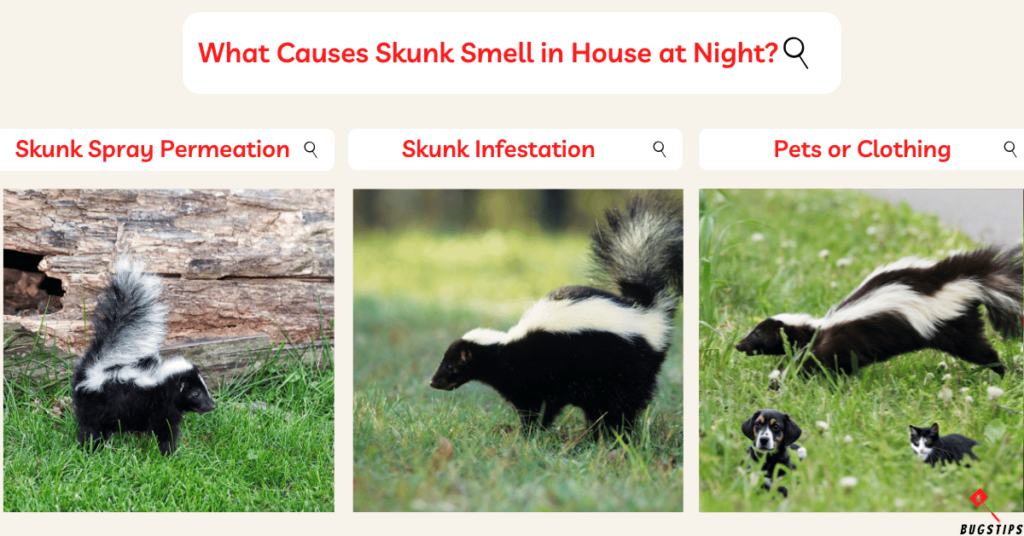
- Skunk Spray Permeation
- Skunk spray is composed of sulfur-containing compounds that have a strong and persistent odor. If a skunk sprays in close proximity to your house, the volatile particles in the spray can travel through the air and find their way into your home.
- This can occur through open windows, vents, gaps in doors or windows, or even cracks in the foundation.
- Skunk spray is composed of sulfur-containing compounds that have a strong and persistent odor. If a skunk sprays in close proximity to your house, the volatile particles in the spray can travel through the air and find their way into your home.
- Skunk Infestation
- In some cases, the skunk smell in your house at night may indicate a skunk infestation on your property. Skunks are skilled diggers and may create burrows or dens near or underneath your house.
- The odor from their den or the skunk themselves can seep into your home, especially if there are openings or gaps that allow their scent to permeate.
- In some cases, the skunk smell in your house at night may indicate a skunk infestation on your property. Skunks are skilled diggers and may create burrows or dens near or underneath your house.
- Pets or Clothing
- If you have pets that spend time outdoors or if you come into contact with skunk spray while outside, their fur or your clothing may carry the skunk smell into your house.
- This can happen if your pets have a close encounter with a skunk or if you accidentally step on or near skunk spray residue.
- If you have pets that spend time outdoors or if you come into contact with skunk spray while outside, their fur or your clothing may carry the skunk smell into your house.
Identifying the underlying cause of the skunk smell in your house at night is crucial for effectively addressing the issue. Once you have a better understanding of how the skunk odor is entering your home, you can take the necessary steps to prevent further infiltration and eliminate the lingering smell.
You May Also Like – Wasps at Night | How to Stay Safe and Enjoy Outdoor Activities
Skunk Behavior at Night
What Time Do Skunks Come Out at Night?
Skunks are primarily nocturnal animals, meaning they are most active during the night. They are well-adapted to low-light conditions and have a keen sense of smell and hearing that aid them in their nighttime foraging.
Skunks typically emerge from their dens shortly after dusk, venturing out to search for food, explore their territory, and engage in other nocturnal activities.
What Color is Skunk Spray?
Skunk spray is notorious for its distinct color and pungent odor. The spray itself is typically a bright yellowish or brownish color. This coloration comes from the presence of sulfur-containing compounds, such as thiols, which are responsible for the strong and offensive odor.
The skunk spray’s hue may vary slightly depending on factors like the skunk’s diet, age, and overall health.
Do Skunks Make Noise at Night?
Yes, skunks can indeed make noise at night. While they are generally not vocal animals, there are instances where you may hear skunk-related sounds during the nighttime hours. Skunk sounds often include tapping, tearing, and scratching noises, which are produced by their long, straight, and robust claws.
Female skunks, in particular, may create nests beneath porches or in crawl spaces. If you find yourself hearing stomping, scratching, or hissing sounds late at night while you’re in bed, it is likely that a mother skunk is protecting her babies or fending off an aggressive male.
It’s worth noting that loud pouncing or hissing sounds could indicate the presence of a pregnant skunk residing under your porch. These noises are part of their defensive behaviors and are often associated with their maternal instincts.
Do Skunks Like Light at Night?
Skunks have a natural sensitivity to light, and their eyes are particularly light-sensitive. When it comes to their preferences, skunks tend to shy away from bright lights. In fact, a well-placed motion sensor flood light or any strong source of illumination can startle skunks and drive them away.
It’s important to note that skunks are not attracted to light, nor do they seek it out. Instead, they have a natural inclination to avoid well-lit areas during the nighttime. Their preference for darkness aligns with their nocturnal behavior and their instinct to navigate and forage under the cover of low-light conditions.
Skunk Smell in House at Night: Is It Dangerous?
When encountering a skunk smell in your house at night, you may wonder about the potential dangers associated with it. Here are key points to consider:
- No direct health threat
- Skunk odor, although strong and offensive, is not inherently harmful or toxic.
- Eye and skin irritation
- Direct contact with skunk spray can cause eye and skin irritation.
- If accidentally sprayed, flush the affected area with water and seek medical advice if necessary.
- Direct contact with skunk spray can cause eye and skin irritation.
- Disease transmission
- Skunks can carry diseases like rabies.
- Avoid direct contact with skunks to prevent the risk of bites or scratches and potential disease transmission.
- Skunks can carry diseases like rabies.
While the skunk smell in your house at night is not inherently dangerous from a health perspective, it’s important to be cautious, avoid direct contact with skunk spray, and take appropriate steps to prevent interactions with skunks and mitigate any structural damage they may cause.
How to Get Rid of Skunk Smell in House at Night
Dealing with the lingering skunk smell in your house at night requires prompt action to eliminate the odor.
Here are effective remedies and methods to help you get rid of the skunk smell:
List of Effective Remedies
- Vinegar and Detergent Spray
- Create a mixture by combining equal parts vinegar and water, and adding a teaspoon of detergent.
- Spray the solution on hard interior surfaces affected by the skunk odor. Allow it to sit for a few minutes before wiping it away.
- Create a mixture by combining equal parts vinegar and water, and adding a teaspoon of detergent.
- Hydrogen Peroxide, Dish Detergent, and Baking Soda
- Prepare a mixture of 1 quart of hydrogen peroxide, 1 teaspoon of dish detergent, and ¼ cup of baking soda.
- Apply this solution to the affected area and let it sit for 10-20 minutes before rinsing it off.
- Prepare a mixture of 1 quart of hydrogen peroxide, 1 teaspoon of dish detergent, and ¼ cup of baking soda.
- Activated Charcoal and Vinegar
- Place bowls of vinegar around the house to absorb the skunk odor over a 24-hour period.
- The vinegar helps neutralize and eliminate the smell while the bowls act as odor absorbers.
- Place bowls of vinegar around the house to absorb the skunk odor over a 24-hour period.
- Carpet Odor Remover
- Spread a thin layer of a vacuum-safe odor remover on your carpet. Allow the cleaner to stay on the carpet for at least 30 minutes, or preferably several hours.
- The odor remover will absorb the skunk smell, improving the overall freshness of your carpet.
- Spread a thin layer of a vacuum-safe odor remover on your carpet. Allow the cleaner to stay on the carpet for at least 30 minutes, or preferably several hours.
Related Article – 16 Powerful Scents That Repel Chipmunks
Additional Methods
- Sunlight and Fresh Air
- Open all windows to allow sunlight and fresh air to enter the house. Sunlight helps oxidize the odor, reducing its lifespan.
- Running the fan in your central heating or AC system aids in circulating the air, facilitating the removal of the skunk smell.
- Open all windows to allow sunlight and fresh air to enter the house. Sunlight helps oxidize the odor, reducing its lifespan.
- Air Deodorizers
- Spray air deodorizers specifically designed to mask and remove odors. These products can help alleviate the intensity of the skunk smell and freshen the air.
It is crucial to act quickly and apply these remedies to effectively remove the skunk smell from your house at night. By combining these methods, you can significantly reduce the odor and restore a more pleasant environment.
Remember, these methods are specifically focused on getting rid of the skunk smell that is already present in your house. We will discuss preventive measures in the next section to minimize the chances of encountering skunk odor in the future.
Preventing Skunk Smell in House at Night

Taking preventive measures can help minimize the risk of encountering skunk smell in your house at night.
Here are some useful tips to keep skunks away from your property:
- Install Motion Sensor Lights
- Skunks are nocturnal creatures and prefer dark areas. Installing bright lights around your house can deter skunks from coming near your property, as they dislike well-lit environments.
- Wash Pets Promptly
- If your pets get sprayed by a skunk, wash them outside as soon as possible using a specific Shampoo (kin+kind Oatmeal Shampoo Lavender for Dogs & Cats )
- Promptly washing your pets will help minimize the spread of skunk odor.
- If your pets get sprayed by a skunk, wash them outside as soon as possible using a specific Shampoo (kin+kind Oatmeal Shampoo Lavender for Dogs & Cats )
- Secure Garbage Bins
- Skunks are attracted to food sources, so ensure that your garbage bins have tight-fitting lids.
- Consider using bins made of sturdy materials, such as metal, to prevent skunks from accessing the contents.
- Skunks are attracted to food sources, so ensure that your garbage bins have tight-fitting lids.
- Remove Outdoor Food Sources
- Avoid leaving pet food or birdseed outdoors overnight, as these can attract skunks.
- Feed your pets inside the house to prevent the smell of food from attracting them.
- Avoid leaving pet food or birdseed outdoors overnight, as these can attract skunks.

- Seal Entry Points
- Inspect your property for any potential entry points, such as gaps under porches, decks, or sheds.
- Seal these openings using sturdy materials like wire mesh or concrete to prevent skunks from creating dens beneath your structures.
- Inspect your property for any potential entry points, such as gaps under porches, decks, or sheds.
- Eliminate Sheltering Areas
- Remove clutter, brush piles, and dense vegetation from your yard, as these provide hiding places for skunks.
- Keep your yard well-maintained and free from debris.
- Remove clutter, brush piles, and dense vegetation from your yard, as these provide hiding places for skunks.
- Consult with Professionals
- If you have persistent skunk problems or need help with skunk prevention, consider consulting with professional wildlife control services.
- They can provide expert advice and assistance in implementing effective skunk deterrent strategies.
- If you have persistent skunk problems or need help with skunk prevention, consider consulting with professional wildlife control services.
By implementing these preventive measures, such as securing food sources, improving lighting, and taking prompt action when pets get sprayed, you can significantly reduce the likelihood of skunks visiting your property and the resulting skunk smell in your house at night.
Final Thoughts
To sum it up, the skunk smell in the house at night can be a frustrating problem for homeowners. Skunks spray at night as a form of defense and their spray can seep into your home.
However, you can prevent and address skunk smell by taking preventative measures to keep skunks away from your property and using effective remedies for removing skunk odor.
Remember to stay safe and cautious around skunks and seek professional help if needed. With a little bit of effort, you can keep your home smelling fresh and clean.
FAQs
Why do I smell skunk every night?
If you smell skunk every night, it could mean that there is a skunk living in close proximity to your house or somewhere nearby. Skunks are known for their strong odor, and if they are present in the area, their smell can waft into your surroundings, especially during the night when they are more active.
Smelling skunk while sleeping?
If you smell skunk while sleeping, it could be due to the presence of skunks in the area or the odor seeping into your living space. The strong smell of skunk can be quite noticeable and may wake you up or disturb your sleep.
Can you smell a skunk from inside your house?
Yes, humans can smell the spray of a skunk from up to 3.5 miles away, meaning that smelling one at night implies that the skunk is close by.
How does skunk spray get inside the house?
Skunk spray can get inside the house through open windows, doors, or vents. It can also seep through walls and other porous surfaces.
Is skunk smell harmful to humans?
Skunk smell is not typically harmful to humans. The odor can cause discomfort, nausea, and headaches, but it is generally not considered toxic or dangerous. However, if you have any respiratory issues or allergies, it is best to limit exposure to the smell and seek fresh air.
Why do skunks scream at night?
Skunks may scream at night for various reasons. It could be a form of communication between skunks, especially during territorial disputes or mating season. Skunk screams can also be a defensive mechanism to ward off potential threats or predators.
How do I stop my house from smelling like skunk?
To stop your house from smelling like skunk, you can try opening all windows and letting in sunlight, spraying air deodorizers, using a vacuum-safe odor remover on your carpets, placing bowls of vinegar around the house, and washing your pets if they get sprayed by a skunk.
Resources – (for further reading)
California State University, Long Beach – Dealing with Striped Skunks – Mammal Lab
University of Nebraska–Lincoln – Removing Skunk Odor – Nebraska Extension Wildlife
UC ANR – Skunks – UC IPM

